ES120L: Historical and Institutional Perspectives on the EU
VerifiedAdded on 2022/08/15
|13
|2676
|10
Essay
AI Summary
This essay delves into the historical and institutional perspectives of the European Union, focusing on two scholarly articles by Ian Manners: "European communion: political theory of European union" and "Normative Power Europe: A Contradiction in Terms?" The essay examines the theoretical frameworks and historical elements within these articles, highlighting Manners' contributions to European Studies. It explores how historical context shapes the understanding of the EU's political objectives, international role, and the concept of normative power. The analysis includes the role of historical case studies, the evolution of the EU's influence, and the interplay between political theory and historical events, particularly in relation to the abolition of the death penalty. The essay also discusses the importance of consolidation within the EU and the historical significance of events like the Schuman Declaration. The paper emphasizes the importance of understanding both the historical and theoretical underpinnings of the EU for a comprehensive understanding of its evolution and influence.
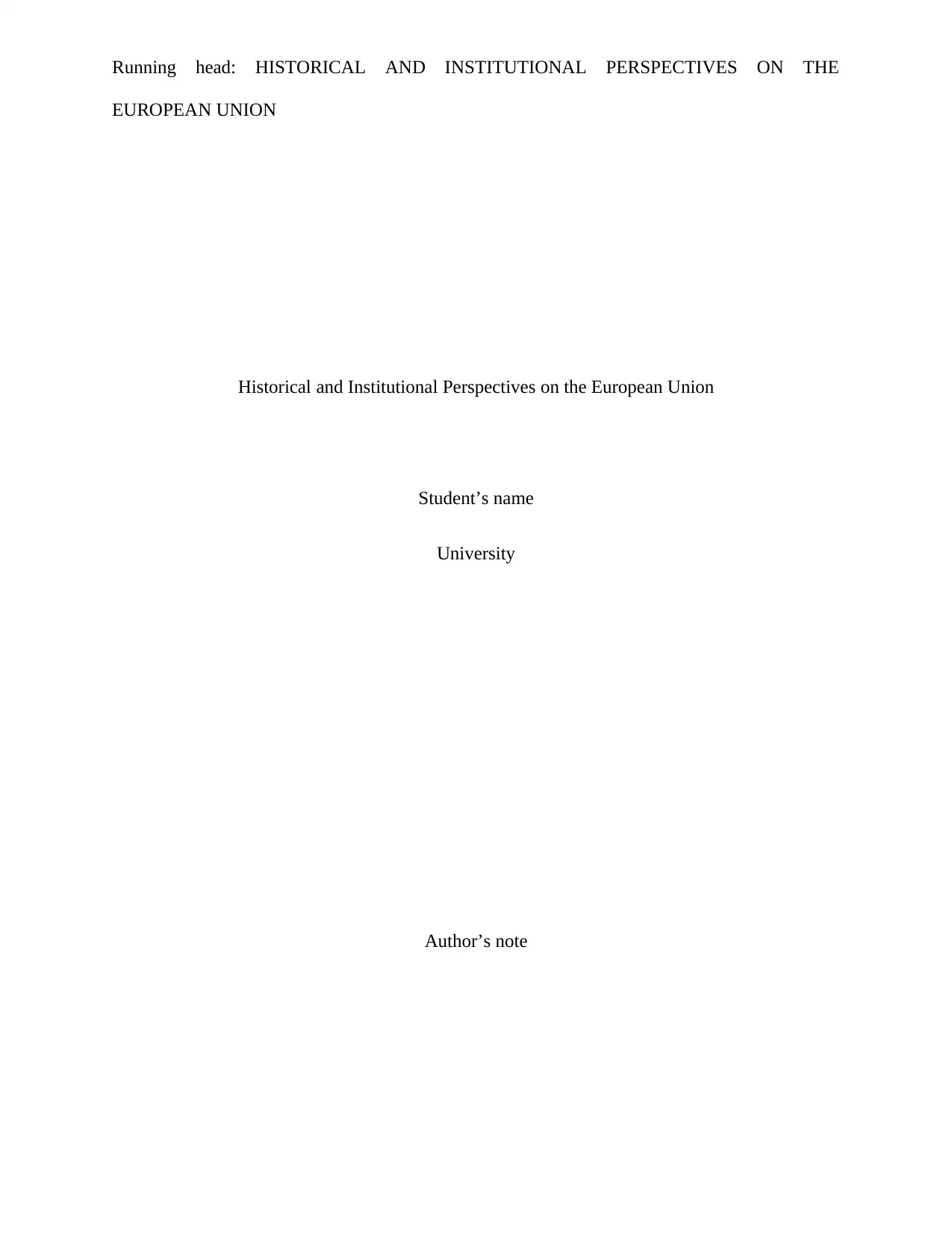
Running head: HISTORICAL AND INSTITUTIONAL PERSPECTIVES ON THE
EUROPEAN UNION
Historical and Institutional Perspectives on the European Union
Student’s name
University
Author’s note
EUROPEAN UNION
Historical and Institutional Perspectives on the European Union
Student’s name
University
Author’s note
Paraphrase This Document
Need a fresh take? Get an instant paraphrase of this document with our AI Paraphraser
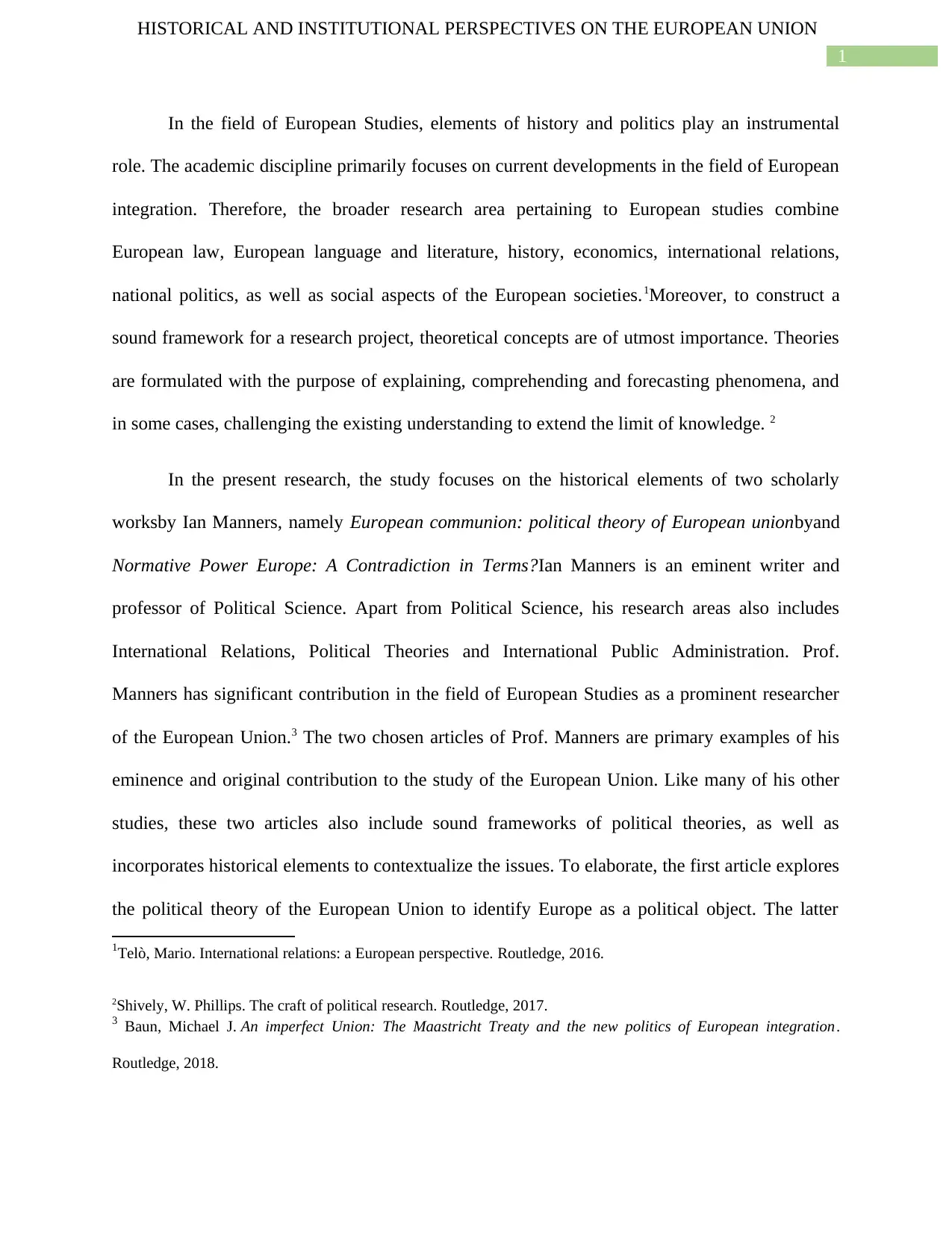
1
HISTORICAL AND INSTITUTIONAL PERSPECTIVES ON THE EUROPEAN UNION
In the field of European Studies, elements of history and politics play an instrumental
role. The academic discipline primarily focuses on current developments in the field of European
integration. Therefore, the broader research area pertaining to European studies combine
European law, European language and literature, history, economics, international relations,
national politics, as well as social aspects of the European societies.1Moreover, to construct a
sound framework for a research project, theoretical concepts are of utmost importance. Theories
are formulated with the purpose of explaining, comprehending and forecasting phenomena, and
in some cases, challenging the existing understanding to extend the limit of knowledge. 2
In the present research, the study focuses on the historical elements of two scholarly
worksby Ian Manners, namely European communion: political theory of European unionbyand
Normative Power Europe: A Contradiction in Terms?Ian Manners is an eminent writer and
professor of Political Science. Apart from Political Science, his research areas also includes
International Relations, Political Theories and International Public Administration. Prof.
Manners has significant contribution in the field of European Studies as a prominent researcher
of the European Union.3 The two chosen articles of Prof. Manners are primary examples of his
eminence and original contribution to the study of the European Union. Like many of his other
studies, these two articles also include sound frameworks of political theories, as well as
incorporates historical elements to contextualize the issues. To elaborate, the first article explores
the political theory of the European Union to identify Europe as a political object. The latter
1Telò, Mario. International relations: a European perspective. Routledge, 2016.
2Shively, W. Phillips. The craft of political research. Routledge, 2017.
3 Baun, Michael J. An imperfect Union: The Maastricht Treaty and the new politics of European integration.
Routledge, 2018.
HISTORICAL AND INSTITUTIONAL PERSPECTIVES ON THE EUROPEAN UNION
In the field of European Studies, elements of history and politics play an instrumental
role. The academic discipline primarily focuses on current developments in the field of European
integration. Therefore, the broader research area pertaining to European studies combine
European law, European language and literature, history, economics, international relations,
national politics, as well as social aspects of the European societies.1Moreover, to construct a
sound framework for a research project, theoretical concepts are of utmost importance. Theories
are formulated with the purpose of explaining, comprehending and forecasting phenomena, and
in some cases, challenging the existing understanding to extend the limit of knowledge. 2
In the present research, the study focuses on the historical elements of two scholarly
worksby Ian Manners, namely European communion: political theory of European unionbyand
Normative Power Europe: A Contradiction in Terms?Ian Manners is an eminent writer and
professor of Political Science. Apart from Political Science, his research areas also includes
International Relations, Political Theories and International Public Administration. Prof.
Manners has significant contribution in the field of European Studies as a prominent researcher
of the European Union.3 The two chosen articles of Prof. Manners are primary examples of his
eminence and original contribution to the study of the European Union. Like many of his other
studies, these two articles also include sound frameworks of political theories, as well as
incorporates historical elements to contextualize the issues. To elaborate, the first article explores
the political theory of the European Union to identify Europe as a political object. The latter
1Telò, Mario. International relations: a European perspective. Routledge, 2016.
2Shively, W. Phillips. The craft of political research. Routledge, 2017.
3 Baun, Michael J. An imperfect Union: The Maastricht Treaty and the new politics of European integration.
Routledge, 2018.
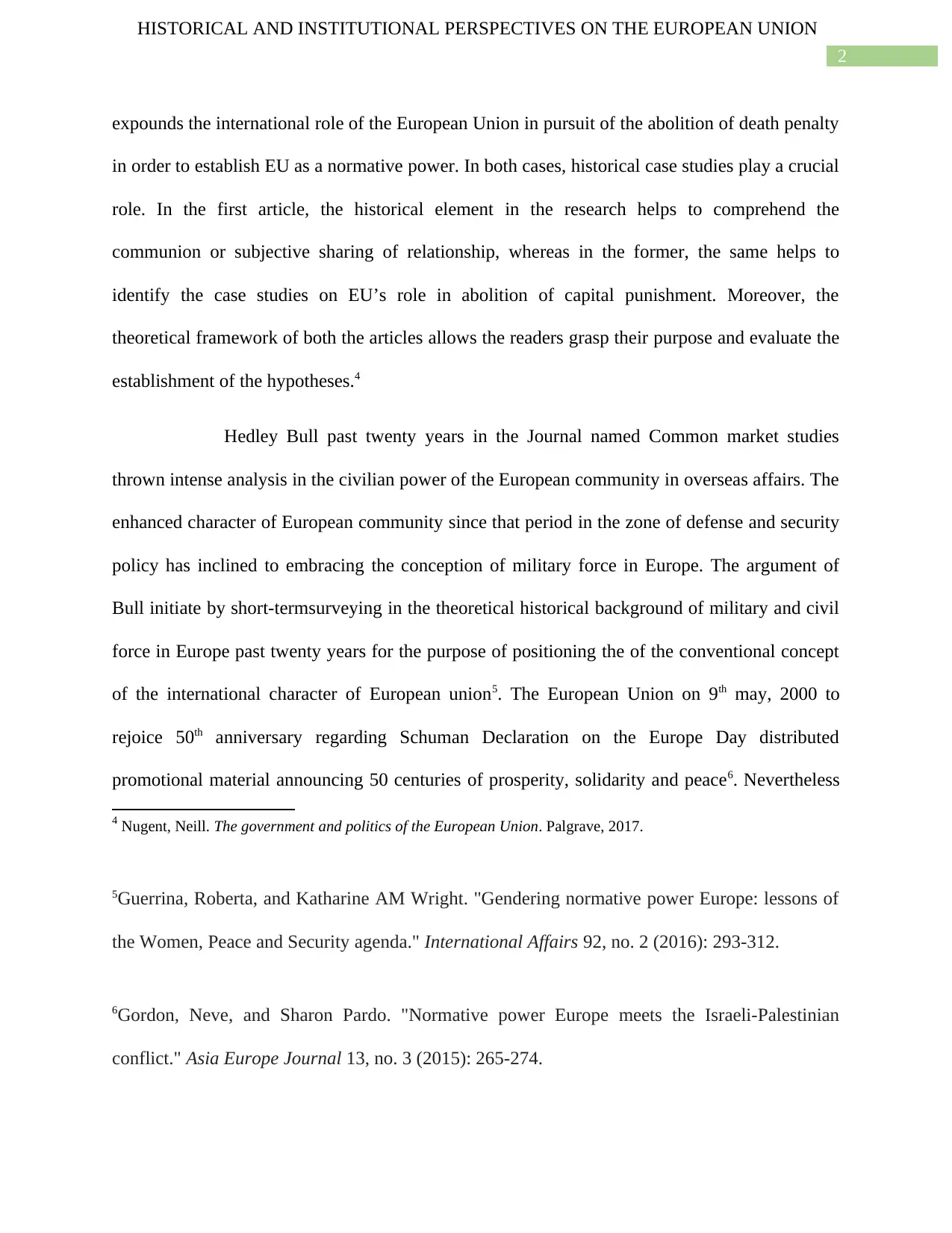
2
HISTORICAL AND INSTITUTIONAL PERSPECTIVES ON THE EUROPEAN UNION
expounds the international role of the European Union in pursuit of the abolition of death penalty
in order to establish EU as a normative power. In both cases, historical case studies play a crucial
role. In the first article, the historical element in the research helps to comprehend the
communion or subjective sharing of relationship, whereas in the former, the same helps to
identify the case studies on EU’s role in abolition of capital punishment. Moreover, the
theoretical framework of both the articles allows the readers grasp their purpose and evaluate the
establishment of the hypotheses.4
Hedley Bull past twenty years in the Journal named Common market studies
thrown intense analysis in the civilian power of the European community in overseas affairs. The
enhanced character of European community since that period in the zone of defense and security
policy has inclined to embracing the conception of military force in Europe. The argument of
Bull initiate by short-termsurveying in the theoretical historical background of military and civil
force in Europe past twenty years for the purpose of positioning the of the conventional concept
of the international character of European union5. The European Union on 9th may, 2000 to
rejoice 50th anniversary regarding Schuman Declaration on the Europe Day distributed
promotional material announcing 50 centuries of prosperity, solidarity and peace6. Nevertheless
4 Nugent, Neill. The government and politics of the European Union. Palgrave, 2017.
5Guerrina, Roberta, and Katharine AM Wright. "Gendering normative power Europe: lessons of
the Women, Peace and Security agenda." International Affairs 92, no. 2 (2016): 293-312.
6Gordon, Neve, and Sharon Pardo. "Normative power Europe meets the Israeli-Palestinian
conflict." Asia Europe Journal 13, no. 3 (2015): 265-274.
HISTORICAL AND INSTITUTIONAL PERSPECTIVES ON THE EUROPEAN UNION
expounds the international role of the European Union in pursuit of the abolition of death penalty
in order to establish EU as a normative power. In both cases, historical case studies play a crucial
role. In the first article, the historical element in the research helps to comprehend the
communion or subjective sharing of relationship, whereas in the former, the same helps to
identify the case studies on EU’s role in abolition of capital punishment. Moreover, the
theoretical framework of both the articles allows the readers grasp their purpose and evaluate the
establishment of the hypotheses.4
Hedley Bull past twenty years in the Journal named Common market studies
thrown intense analysis in the civilian power of the European community in overseas affairs. The
enhanced character of European community since that period in the zone of defense and security
policy has inclined to embracing the conception of military force in Europe. The argument of
Bull initiate by short-termsurveying in the theoretical historical background of military and civil
force in Europe past twenty years for the purpose of positioning the of the conventional concept
of the international character of European union5. The European Union on 9th may, 2000 to
rejoice 50th anniversary regarding Schuman Declaration on the Europe Day distributed
promotional material announcing 50 centuries of prosperity, solidarity and peace6. Nevertheless
4 Nugent, Neill. The government and politics of the European Union. Palgrave, 2017.
5Guerrina, Roberta, and Katharine AM Wright. "Gendering normative power Europe: lessons of
the Women, Peace and Security agenda." International Affairs 92, no. 2 (2016): 293-312.
6Gordon, Neve, and Sharon Pardo. "Normative power Europe meets the Israeli-Palestinian
conflict." Asia Europe Journal 13, no. 3 (2015): 265-274.
⊘ This is a preview!⊘
Do you want full access?
Subscribe today to unlock all pages.

Trusted by 1+ million students worldwide
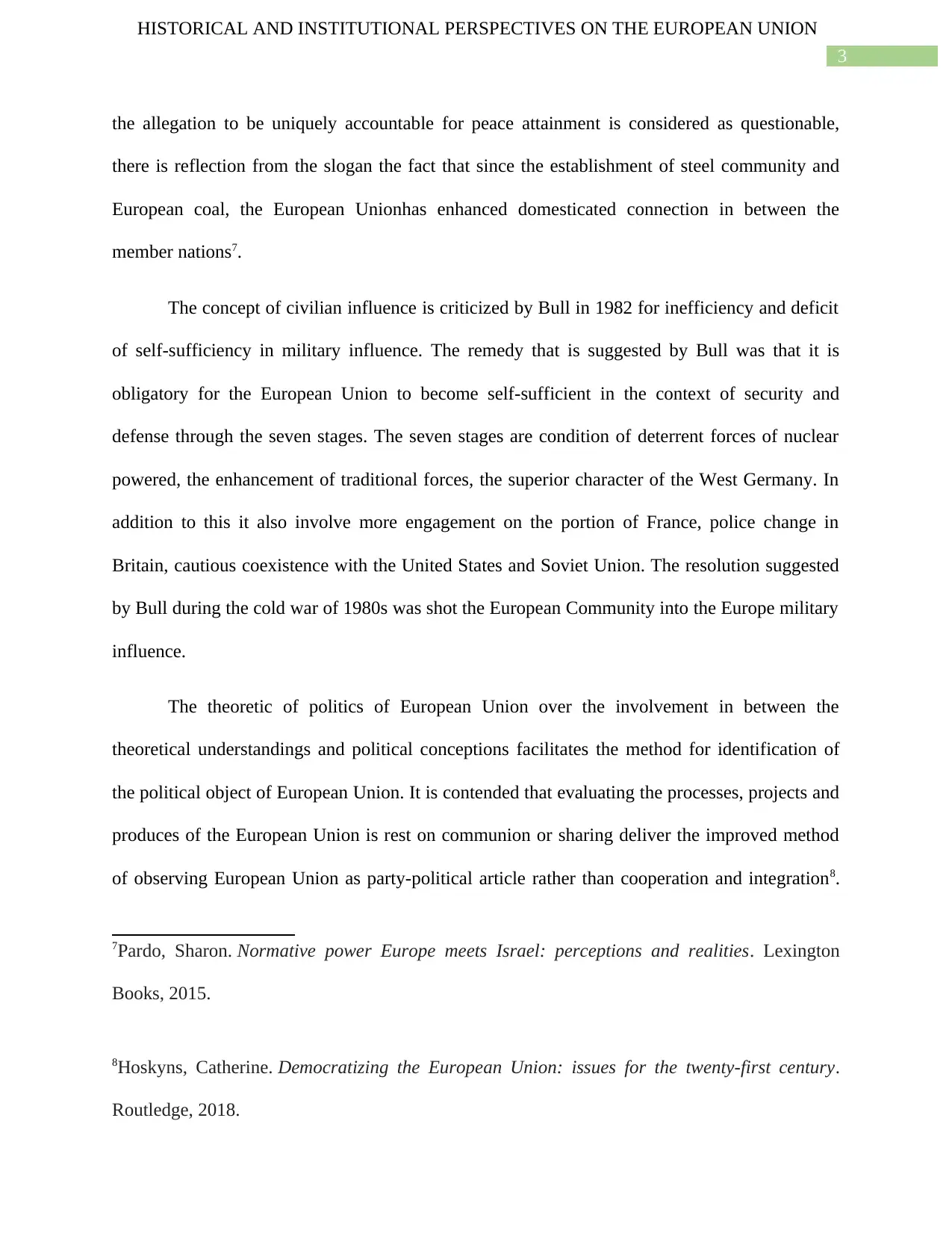
3
HISTORICAL AND INSTITUTIONAL PERSPECTIVES ON THE EUROPEAN UNION
the allegation to be uniquely accountable for peace attainment is considered as questionable,
there is reflection from the slogan the fact that since the establishment of steel community and
European coal, the European Unionhas enhanced domesticated connection in between the
member nations7.
The concept of civilian influence is criticized by Bull in 1982 for inefficiency and deficit
of self-sufficiency in military influence. The remedy that is suggested by Bull was that it is
obligatory for the European Union to become self-sufficient in the context of security and
defense through the seven stages. The seven stages are condition of deterrent forces of nuclear
powered, the enhancement of traditional forces, the superior character of the West Germany. In
addition to this it also involve more engagement on the portion of France, police change in
Britain, cautious coexistence with the United States and Soviet Union. The resolution suggested
by Bull during the cold war of 1980s was shot the European Community into the Europe military
influence.
The theoretic of politics of European Union over the involvement in between the
theoretical understandings and political conceptions facilitates the method for identification of
the political object of European Union. It is contended that evaluating the processes, projects and
produces of the European Union is rest on communion or sharing deliver the improved method
of observing European Union as party-political article rather than cooperation and integration8.
7Pardo, Sharon. Normative power Europe meets Israel: perceptions and realities. Lexington
Books, 2015.
8Hoskyns, Catherine. Democratizing the European Union: issues for the twenty-first century.
Routledge, 2018.
HISTORICAL AND INSTITUTIONAL PERSPECTIVES ON THE EUROPEAN UNION
the allegation to be uniquely accountable for peace attainment is considered as questionable,
there is reflection from the slogan the fact that since the establishment of steel community and
European coal, the European Unionhas enhanced domesticated connection in between the
member nations7.
The concept of civilian influence is criticized by Bull in 1982 for inefficiency and deficit
of self-sufficiency in military influence. The remedy that is suggested by Bull was that it is
obligatory for the European Union to become self-sufficient in the context of security and
defense through the seven stages. The seven stages are condition of deterrent forces of nuclear
powered, the enhancement of traditional forces, the superior character of the West Germany. In
addition to this it also involve more engagement on the portion of France, police change in
Britain, cautious coexistence with the United States and Soviet Union. The resolution suggested
by Bull during the cold war of 1980s was shot the European Community into the Europe military
influence.
The theoretic of politics of European Union over the involvement in between the
theoretical understandings and political conceptions facilitates the method for identification of
the political object of European Union. It is contended that evaluating the processes, projects and
produces of the European Union is rest on communion or sharing deliver the improved method
of observing European Union as party-political article rather than cooperation and integration8.
7Pardo, Sharon. Normative power Europe meets Israel: perceptions and realities. Lexington
Books, 2015.
8Hoskyns, Catherine. Democratizing the European Union: issues for the twenty-first century.
Routledge, 2018.
Paraphrase This Document
Need a fresh take? Get an instant paraphrase of this document with our AI Paraphraser
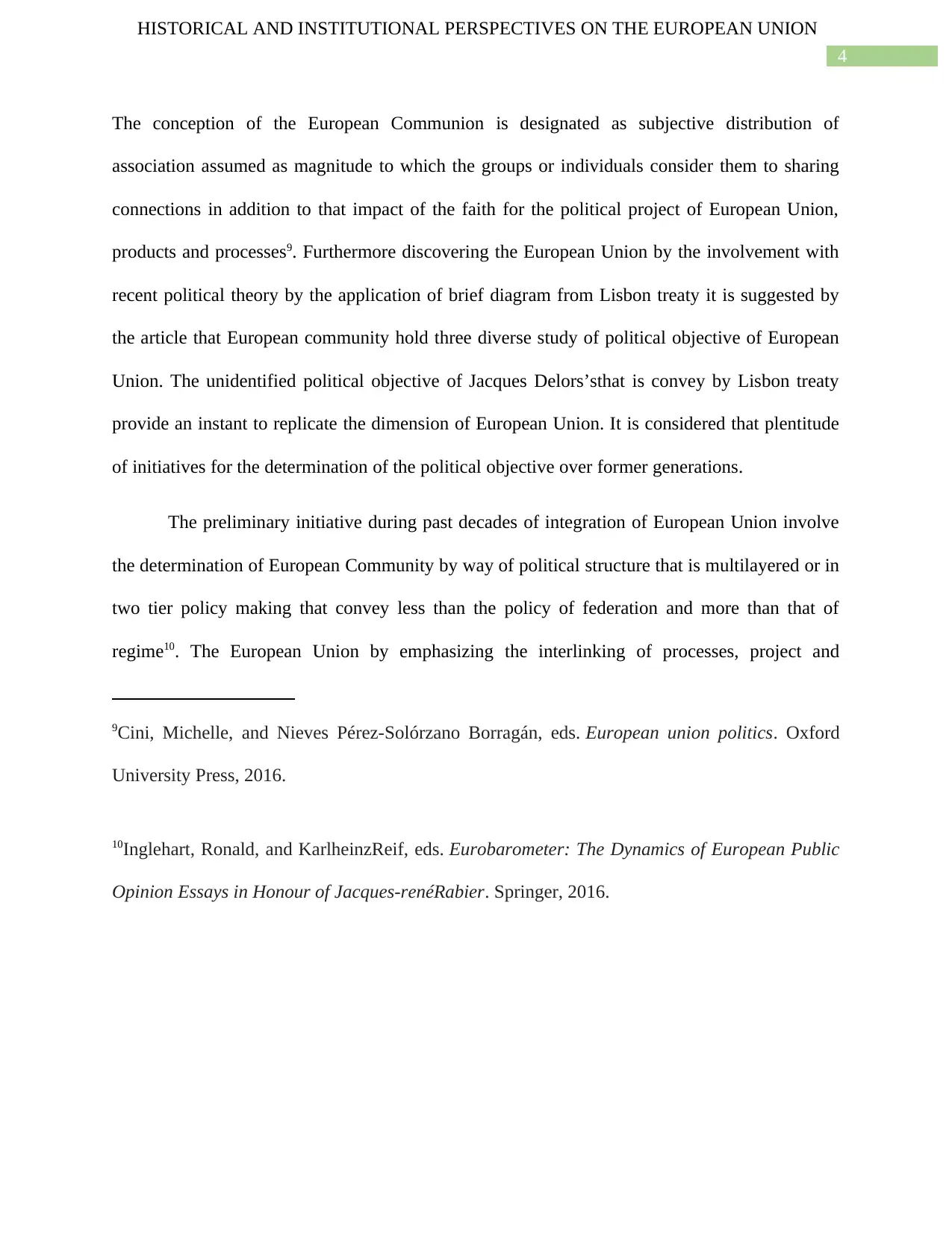
4
HISTORICAL AND INSTITUTIONAL PERSPECTIVES ON THE EUROPEAN UNION
The conception of the European Communion is designated as subjective distribution of
association assumed as magnitude to which the groups or individuals consider them to sharing
connections in addition to that impact of the faith for the political project of European Union,
products and processes9. Furthermore discovering the European Union by the involvement with
recent political theory by the application of brief diagram from Lisbon treaty it is suggested by
the article that European community hold three diverse study of political objective of European
Union. The unidentified political objective of Jacques Delors’sthat is convey by Lisbon treaty
provide an instant to replicate the dimension of European Union. It is considered that plentitude
of initiatives for the determination of the political objective over former generations.
The preliminary initiative during past decades of integration of European Union involve
the determination of European Community by way of political structure that is multilayered or in
two tier policy making that convey less than the policy of federation and more than that of
regime10. The European Union by emphasizing the interlinking of processes, project and
9Cini, Michelle, and Nieves Pérez-Solórzano Borragán, eds. European union politics. Oxford
University Press, 2016.
10Inglehart, Ronald, and KarlheinzReif, eds. Eurobarometer: The Dynamics of European Public
Opinion Essays in Honour of Jacques-renéRabier. Springer, 2016.
HISTORICAL AND INSTITUTIONAL PERSPECTIVES ON THE EUROPEAN UNION
The conception of the European Communion is designated as subjective distribution of
association assumed as magnitude to which the groups or individuals consider them to sharing
connections in addition to that impact of the faith for the political project of European Union,
products and processes9. Furthermore discovering the European Union by the involvement with
recent political theory by the application of brief diagram from Lisbon treaty it is suggested by
the article that European community hold three diverse study of political objective of European
Union. The unidentified political objective of Jacques Delors’sthat is convey by Lisbon treaty
provide an instant to replicate the dimension of European Union. It is considered that plentitude
of initiatives for the determination of the political objective over former generations.
The preliminary initiative during past decades of integration of European Union involve
the determination of European Community by way of political structure that is multilayered or in
two tier policy making that convey less than the policy of federation and more than that of
regime10. The European Union by emphasizing the interlinking of processes, project and
9Cini, Michelle, and Nieves Pérez-Solórzano Borragán, eds. European union politics. Oxford
University Press, 2016.
10Inglehart, Ronald, and KarlheinzReif, eds. Eurobarometer: The Dynamics of European Public
Opinion Essays in Honour of Jacques-renéRabier. Springer, 2016.
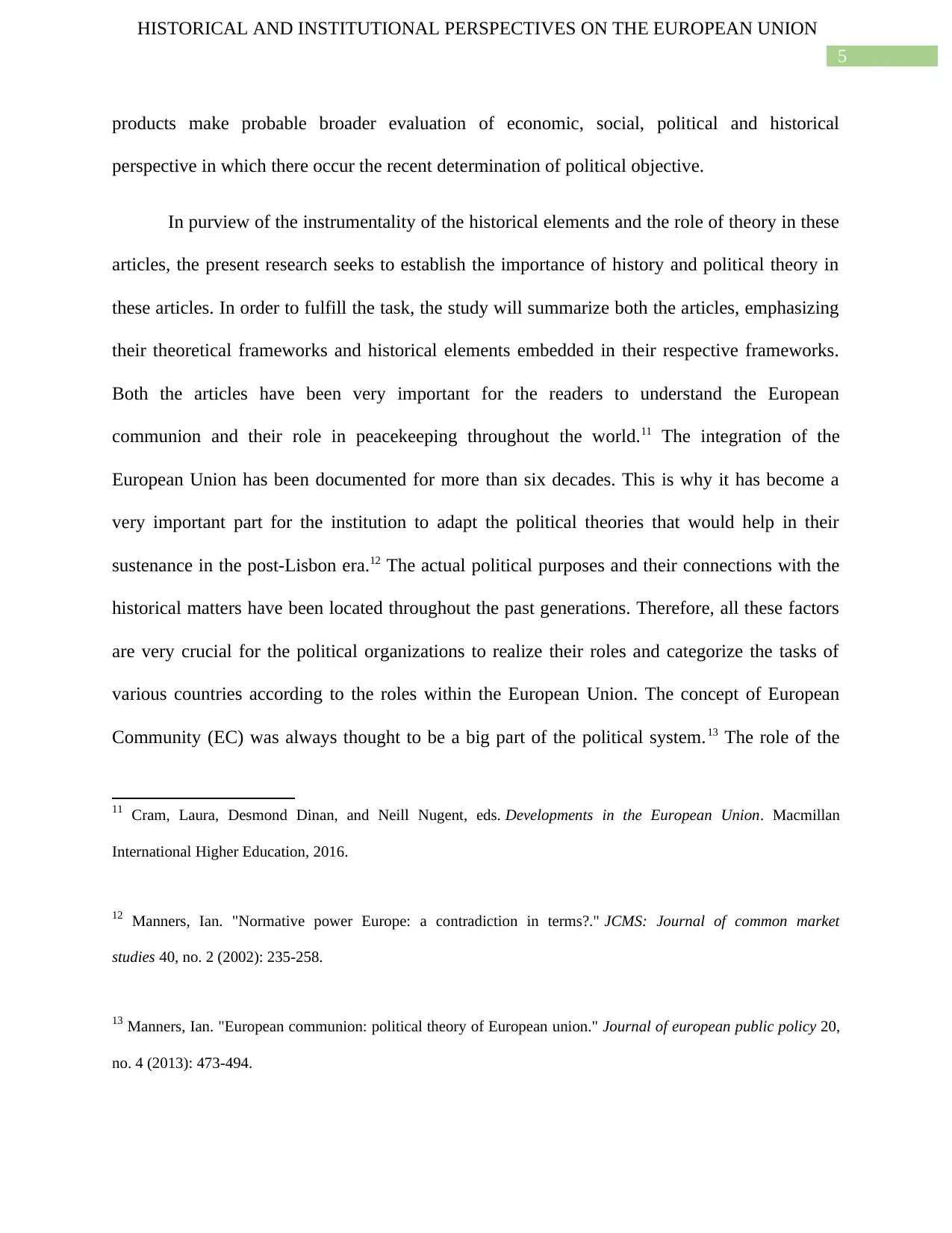
5
HISTORICAL AND INSTITUTIONAL PERSPECTIVES ON THE EUROPEAN UNION
products make probable broader evaluation of economic, social, political and historical
perspective in which there occur the recent determination of political objective.
In purview of the instrumentality of the historical elements and the role of theory in these
articles, the present research seeks to establish the importance of history and political theory in
these articles. In order to fulfill the task, the study will summarize both the articles, emphasizing
their theoretical frameworks and historical elements embedded in their respective frameworks.
Both the articles have been very important for the readers to understand the European
communion and their role in peacekeeping throughout the world.11 The integration of the
European Union has been documented for more than six decades. This is why it has become a
very important part for the institution to adapt the political theories that would help in their
sustenance in the post-Lisbon era.12 The actual political purposes and their connections with the
historical matters have been located throughout the past generations. Therefore, all these factors
are very crucial for the political organizations to realize their roles and categorize the tasks of
various countries according to the roles within the European Union. The concept of European
Community (EC) was always thought to be a big part of the political system.13 The role of the
11 Cram, Laura, Desmond Dinan, and Neill Nugent, eds. Developments in the European Union. Macmillan
International Higher Education, 2016.
12 Manners, Ian. "Normative power Europe: a contradiction in terms?." JCMS: Journal of common market
studies 40, no. 2 (2002): 235-258.
13 Manners, Ian. "European communion: political theory of European union." Journal of european public policy 20,
no. 4 (2013): 473-494.
HISTORICAL AND INSTITUTIONAL PERSPECTIVES ON THE EUROPEAN UNION
products make probable broader evaluation of economic, social, political and historical
perspective in which there occur the recent determination of political objective.
In purview of the instrumentality of the historical elements and the role of theory in these
articles, the present research seeks to establish the importance of history and political theory in
these articles. In order to fulfill the task, the study will summarize both the articles, emphasizing
their theoretical frameworks and historical elements embedded in their respective frameworks.
Both the articles have been very important for the readers to understand the European
communion and their role in peacekeeping throughout the world.11 The integration of the
European Union has been documented for more than six decades. This is why it has become a
very important part for the institution to adapt the political theories that would help in their
sustenance in the post-Lisbon era.12 The actual political purposes and their connections with the
historical matters have been located throughout the past generations. Therefore, all these factors
are very crucial for the political organizations to realize their roles and categorize the tasks of
various countries according to the roles within the European Union. The concept of European
Community (EC) was always thought to be a big part of the political system.13 The role of the
11 Cram, Laura, Desmond Dinan, and Neill Nugent, eds. Developments in the European Union. Macmillan
International Higher Education, 2016.
12 Manners, Ian. "Normative power Europe: a contradiction in terms?." JCMS: Journal of common market
studies 40, no. 2 (2002): 235-258.
13 Manners, Ian. "European communion: political theory of European union." Journal of european public policy 20,
no. 4 (2013): 473-494.
⊘ This is a preview!⊘
Do you want full access?
Subscribe today to unlock all pages.

Trusted by 1+ million students worldwide
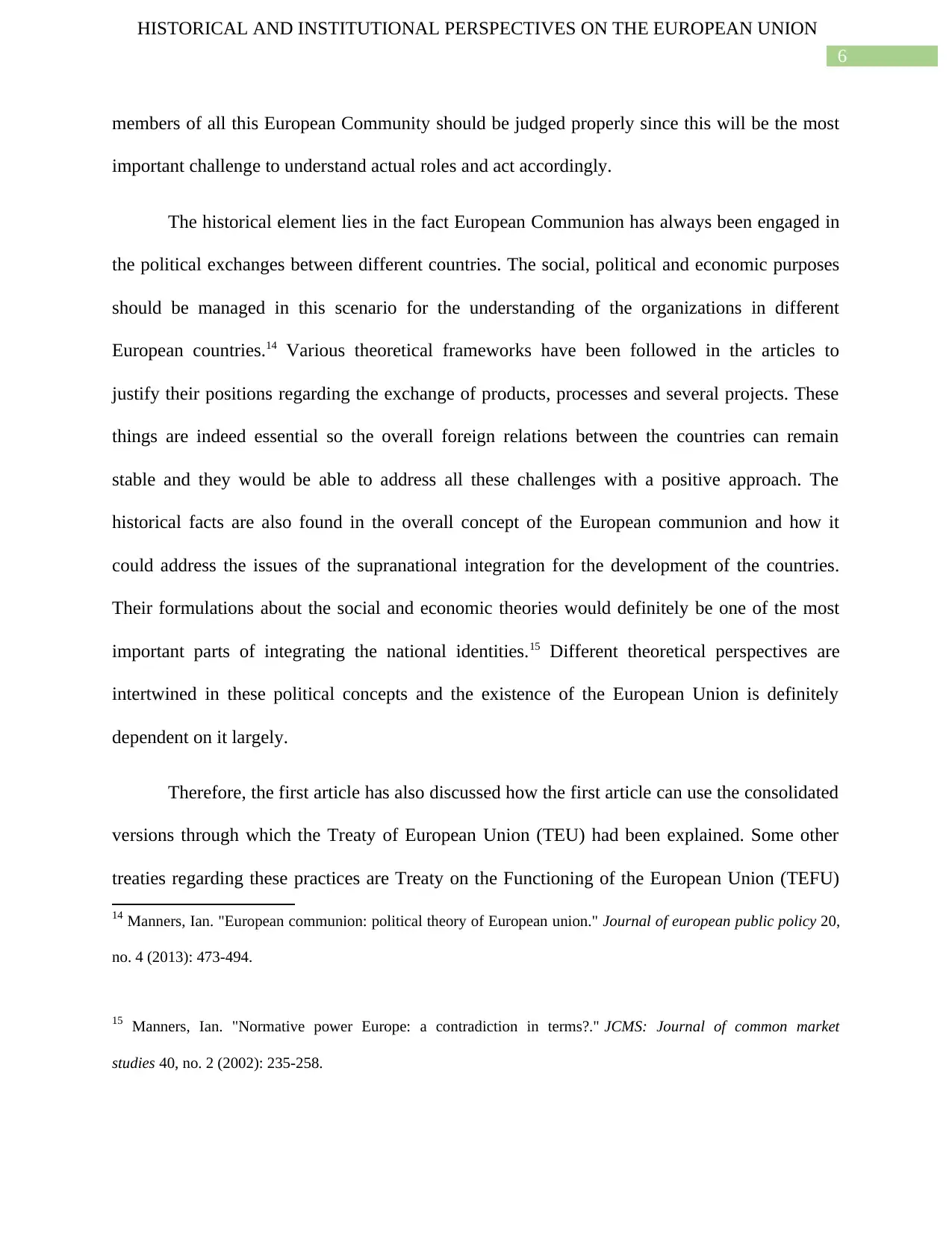
6
HISTORICAL AND INSTITUTIONAL PERSPECTIVES ON THE EUROPEAN UNION
members of all this European Community should be judged properly since this will be the most
important challenge to understand actual roles and act accordingly.
The historical element lies in the fact European Communion has always been engaged in
the political exchanges between different countries. The social, political and economic purposes
should be managed in this scenario for the understanding of the organizations in different
European countries.14 Various theoretical frameworks have been followed in the articles to
justify their positions regarding the exchange of products, processes and several projects. These
things are indeed essential so the overall foreign relations between the countries can remain
stable and they would be able to address all these challenges with a positive approach. The
historical facts are also found in the overall concept of the European communion and how it
could address the issues of the supranational integration for the development of the countries.
Their formulations about the social and economic theories would definitely be one of the most
important parts of integrating the national identities.15 Different theoretical perspectives are
intertwined in these political concepts and the existence of the European Union is definitely
dependent on it largely.
Therefore, the first article has also discussed how the first article can use the consolidated
versions through which the Treaty of European Union (TEU) had been explained. Some other
treaties regarding these practices are Treaty on the Functioning of the European Union (TEFU)
14 Manners, Ian. "European communion: political theory of European union." Journal of european public policy 20,
no. 4 (2013): 473-494.
15 Manners, Ian. "Normative power Europe: a contradiction in terms?." JCMS: Journal of common market
studies 40, no. 2 (2002): 235-258.
HISTORICAL AND INSTITUTIONAL PERSPECTIVES ON THE EUROPEAN UNION
members of all this European Community should be judged properly since this will be the most
important challenge to understand actual roles and act accordingly.
The historical element lies in the fact European Communion has always been engaged in
the political exchanges between different countries. The social, political and economic purposes
should be managed in this scenario for the understanding of the organizations in different
European countries.14 Various theoretical frameworks have been followed in the articles to
justify their positions regarding the exchange of products, processes and several projects. These
things are indeed essential so the overall foreign relations between the countries can remain
stable and they would be able to address all these challenges with a positive approach. The
historical facts are also found in the overall concept of the European communion and how it
could address the issues of the supranational integration for the development of the countries.
Their formulations about the social and economic theories would definitely be one of the most
important parts of integrating the national identities.15 Different theoretical perspectives are
intertwined in these political concepts and the existence of the European Union is definitely
dependent on it largely.
Therefore, the first article has also discussed how the first article can use the consolidated
versions through which the Treaty of European Union (TEU) had been explained. Some other
treaties regarding these practices are Treaty on the Functioning of the European Union (TEFU)
14 Manners, Ian. "European communion: political theory of European union." Journal of european public policy 20,
no. 4 (2013): 473-494.
15 Manners, Ian. "Normative power Europe: a contradiction in terms?." JCMS: Journal of common market
studies 40, no. 2 (2002): 235-258.
Paraphrase This Document
Need a fresh take? Get an instant paraphrase of this document with our AI Paraphraser
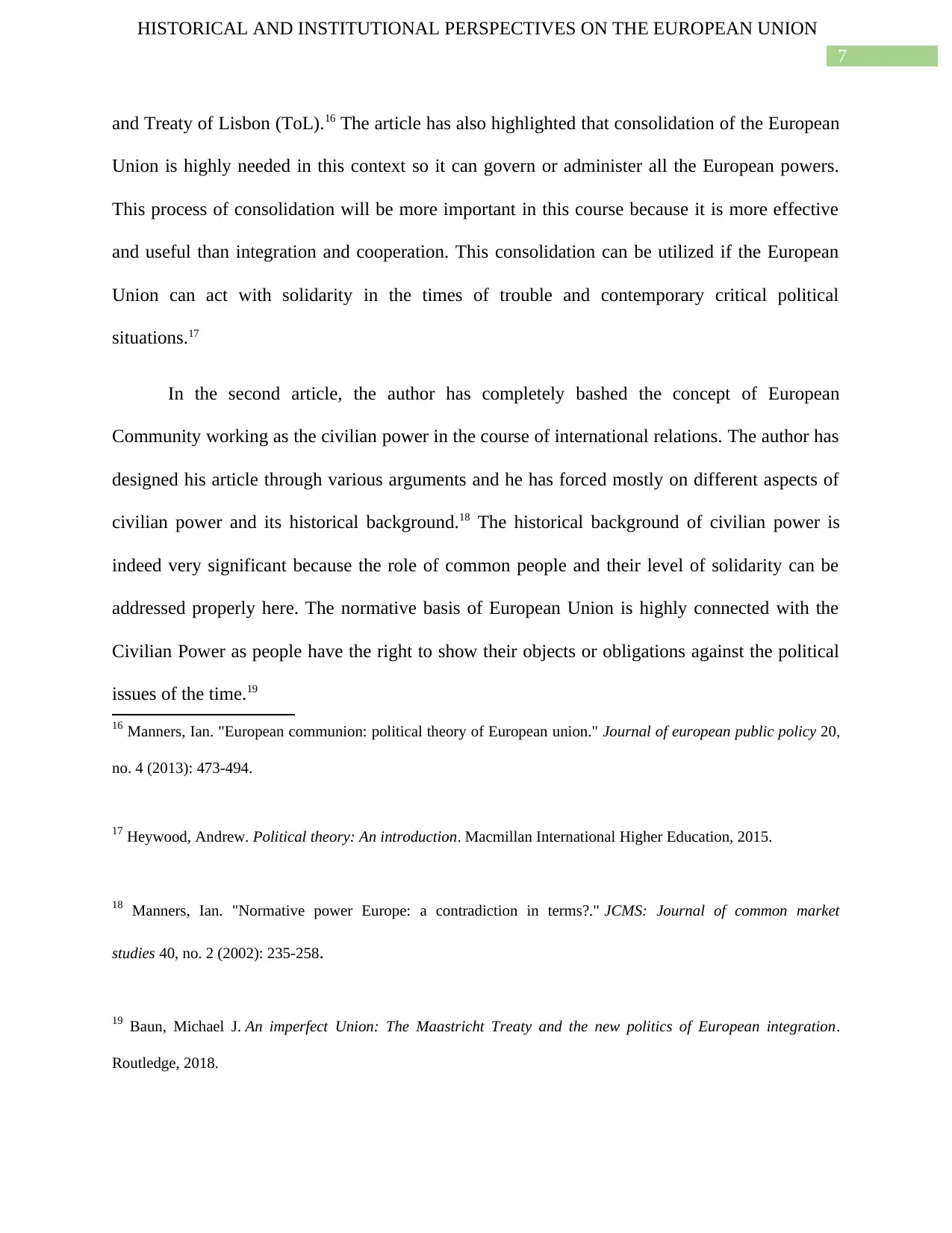
7
HISTORICAL AND INSTITUTIONAL PERSPECTIVES ON THE EUROPEAN UNION
and Treaty of Lisbon (ToL).16 The article has also highlighted that consolidation of the European
Union is highly needed in this context so it can govern or administer all the European powers.
This process of consolidation will be more important in this course because it is more effective
and useful than integration and cooperation. This consolidation can be utilized if the European
Union can act with solidarity in the times of trouble and contemporary critical political
situations.17
In the second article, the author has completely bashed the concept of European
Community working as the civilian power in the course of international relations. The author has
designed his article through various arguments and he has forced mostly on different aspects of
civilian power and its historical background.18 The historical background of civilian power is
indeed very significant because the role of common people and their level of solidarity can be
addressed properly here. The normative basis of European Union is highly connected with the
Civilian Power as people have the right to show their objects or obligations against the political
issues of the time.19
16 Manners, Ian. "European communion: political theory of European union." Journal of european public policy 20,
no. 4 (2013): 473-494.
17 Heywood, Andrew. Political theory: An introduction. Macmillan International Higher Education, 2015.
18 Manners, Ian. "Normative power Europe: a contradiction in terms?." JCMS: Journal of common market
studies 40, no. 2 (2002): 235-258.
19 Baun, Michael J. An imperfect Union: The Maastricht Treaty and the new politics of European integration.
Routledge, 2018.
HISTORICAL AND INSTITUTIONAL PERSPECTIVES ON THE EUROPEAN UNION
and Treaty of Lisbon (ToL).16 The article has also highlighted that consolidation of the European
Union is highly needed in this context so it can govern or administer all the European powers.
This process of consolidation will be more important in this course because it is more effective
and useful than integration and cooperation. This consolidation can be utilized if the European
Union can act with solidarity in the times of trouble and contemporary critical political
situations.17
In the second article, the author has completely bashed the concept of European
Community working as the civilian power in the course of international relations. The author has
designed his article through various arguments and he has forced mostly on different aspects of
civilian power and its historical background.18 The historical background of civilian power is
indeed very significant because the role of common people and their level of solidarity can be
addressed properly here. The normative basis of European Union is highly connected with the
Civilian Power as people have the right to show their objects or obligations against the political
issues of the time.19
16 Manners, Ian. "European communion: political theory of European union." Journal of european public policy 20,
no. 4 (2013): 473-494.
17 Heywood, Andrew. Political theory: An introduction. Macmillan International Higher Education, 2015.
18 Manners, Ian. "Normative power Europe: a contradiction in terms?." JCMS: Journal of common market
studies 40, no. 2 (2002): 235-258.
19 Baun, Michael J. An imperfect Union: The Maastricht Treaty and the new politics of European integration.
Routledge, 2018.
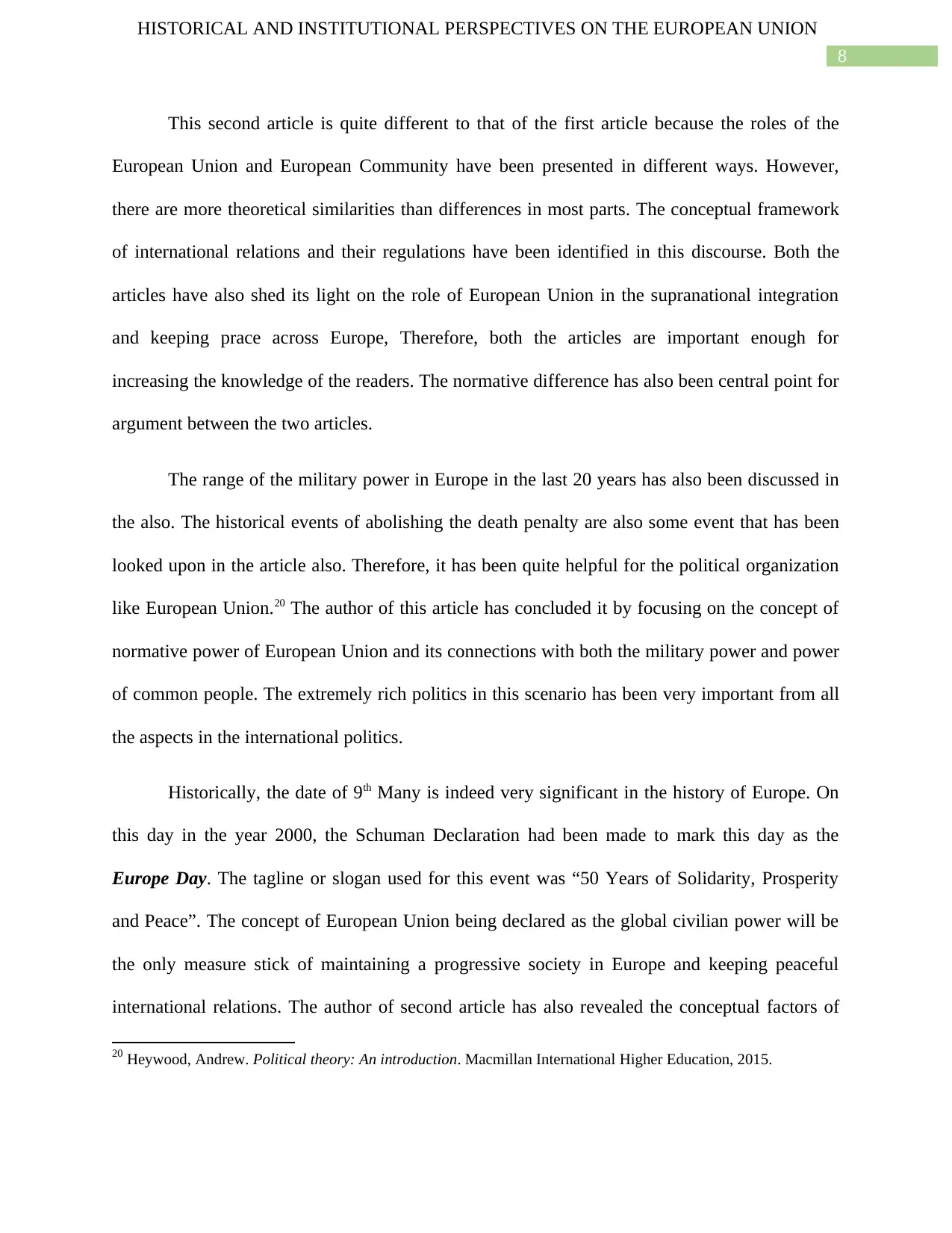
8
HISTORICAL AND INSTITUTIONAL PERSPECTIVES ON THE EUROPEAN UNION
This second article is quite different to that of the first article because the roles of the
European Union and European Community have been presented in different ways. However,
there are more theoretical similarities than differences in most parts. The conceptual framework
of international relations and their regulations have been identified in this discourse. Both the
articles have also shed its light on the role of European Union in the supranational integration
and keeping prace across Europe, Therefore, both the articles are important enough for
increasing the knowledge of the readers. The normative difference has also been central point for
argument between the two articles.
The range of the military power in Europe in the last 20 years has also been discussed in
the also. The historical events of abolishing the death penalty are also some event that has been
looked upon in the article also. Therefore, it has been quite helpful for the political organization
like European Union.20 The author of this article has concluded it by focusing on the concept of
normative power of European Union and its connections with both the military power and power
of common people. The extremely rich politics in this scenario has been very important from all
the aspects in the international politics.
Historically, the date of 9th Many is indeed very significant in the history of Europe. On
this day in the year 2000, the Schuman Declaration had been made to mark this day as the
Europe Day. The tagline or slogan used for this event was “50 Years of Solidarity, Prosperity
and Peace”. The concept of European Union being declared as the global civilian power will be
the only measure stick of maintaining a progressive society in Europe and keeping peaceful
international relations. The author of second article has also revealed the conceptual factors of
20 Heywood, Andrew. Political theory: An introduction. Macmillan International Higher Education, 2015.
HISTORICAL AND INSTITUTIONAL PERSPECTIVES ON THE EUROPEAN UNION
This second article is quite different to that of the first article because the roles of the
European Union and European Community have been presented in different ways. However,
there are more theoretical similarities than differences in most parts. The conceptual framework
of international relations and their regulations have been identified in this discourse. Both the
articles have also shed its light on the role of European Union in the supranational integration
and keeping prace across Europe, Therefore, both the articles are important enough for
increasing the knowledge of the readers. The normative difference has also been central point for
argument between the two articles.
The range of the military power in Europe in the last 20 years has also been discussed in
the also. The historical events of abolishing the death penalty are also some event that has been
looked upon in the article also. Therefore, it has been quite helpful for the political organization
like European Union.20 The author of this article has concluded it by focusing on the concept of
normative power of European Union and its connections with both the military power and power
of common people. The extremely rich politics in this scenario has been very important from all
the aspects in the international politics.
Historically, the date of 9th Many is indeed very significant in the history of Europe. On
this day in the year 2000, the Schuman Declaration had been made to mark this day as the
Europe Day. The tagline or slogan used for this event was “50 Years of Solidarity, Prosperity
and Peace”. The concept of European Union being declared as the global civilian power will be
the only measure stick of maintaining a progressive society in Europe and keeping peaceful
international relations. The author of second article has also revealed the conceptual factors of
20 Heywood, Andrew. Political theory: An introduction. Macmillan International Higher Education, 2015.
⊘ This is a preview!⊘
Do you want full access?
Subscribe today to unlock all pages.

Trusted by 1+ million students worldwide
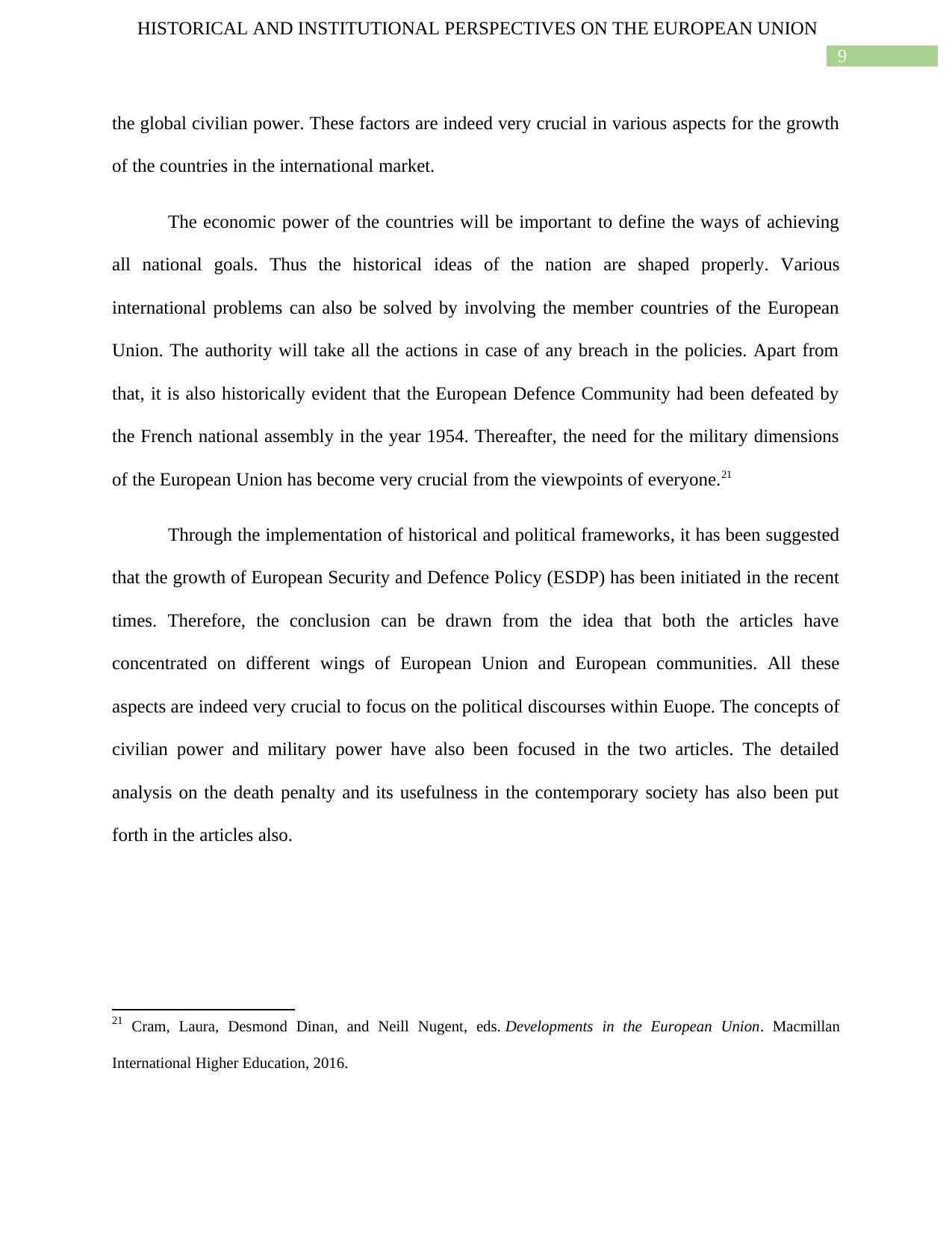
9
HISTORICAL AND INSTITUTIONAL PERSPECTIVES ON THE EUROPEAN UNION
the global civilian power. These factors are indeed very crucial in various aspects for the growth
of the countries in the international market.
The economic power of the countries will be important to define the ways of achieving
all national goals. Thus the historical ideas of the nation are shaped properly. Various
international problems can also be solved by involving the member countries of the European
Union. The authority will take all the actions in case of any breach in the policies. Apart from
that, it is also historically evident that the European Defence Community had been defeated by
the French national assembly in the year 1954. Thereafter, the need for the military dimensions
of the European Union has become very crucial from the viewpoints of everyone.21
Through the implementation of historical and political frameworks, it has been suggested
that the growth of European Security and Defence Policy (ESDP) has been initiated in the recent
times. Therefore, the conclusion can be drawn from the idea that both the articles have
concentrated on different wings of European Union and European communities. All these
aspects are indeed very crucial to focus on the political discourses within Euope. The concepts of
civilian power and military power have also been focused in the two articles. The detailed
analysis on the death penalty and its usefulness in the contemporary society has also been put
forth in the articles also.
21 Cram, Laura, Desmond Dinan, and Neill Nugent, eds. Developments in the European Union. Macmillan
International Higher Education, 2016.
HISTORICAL AND INSTITUTIONAL PERSPECTIVES ON THE EUROPEAN UNION
the global civilian power. These factors are indeed very crucial in various aspects for the growth
of the countries in the international market.
The economic power of the countries will be important to define the ways of achieving
all national goals. Thus the historical ideas of the nation are shaped properly. Various
international problems can also be solved by involving the member countries of the European
Union. The authority will take all the actions in case of any breach in the policies. Apart from
that, it is also historically evident that the European Defence Community had been defeated by
the French national assembly in the year 1954. Thereafter, the need for the military dimensions
of the European Union has become very crucial from the viewpoints of everyone.21
Through the implementation of historical and political frameworks, it has been suggested
that the growth of European Security and Defence Policy (ESDP) has been initiated in the recent
times. Therefore, the conclusion can be drawn from the idea that both the articles have
concentrated on different wings of European Union and European communities. All these
aspects are indeed very crucial to focus on the political discourses within Euope. The concepts of
civilian power and military power have also been focused in the two articles. The detailed
analysis on the death penalty and its usefulness in the contemporary society has also been put
forth in the articles also.
21 Cram, Laura, Desmond Dinan, and Neill Nugent, eds. Developments in the European Union. Macmillan
International Higher Education, 2016.
Paraphrase This Document
Need a fresh take? Get an instant paraphrase of this document with our AI Paraphraser
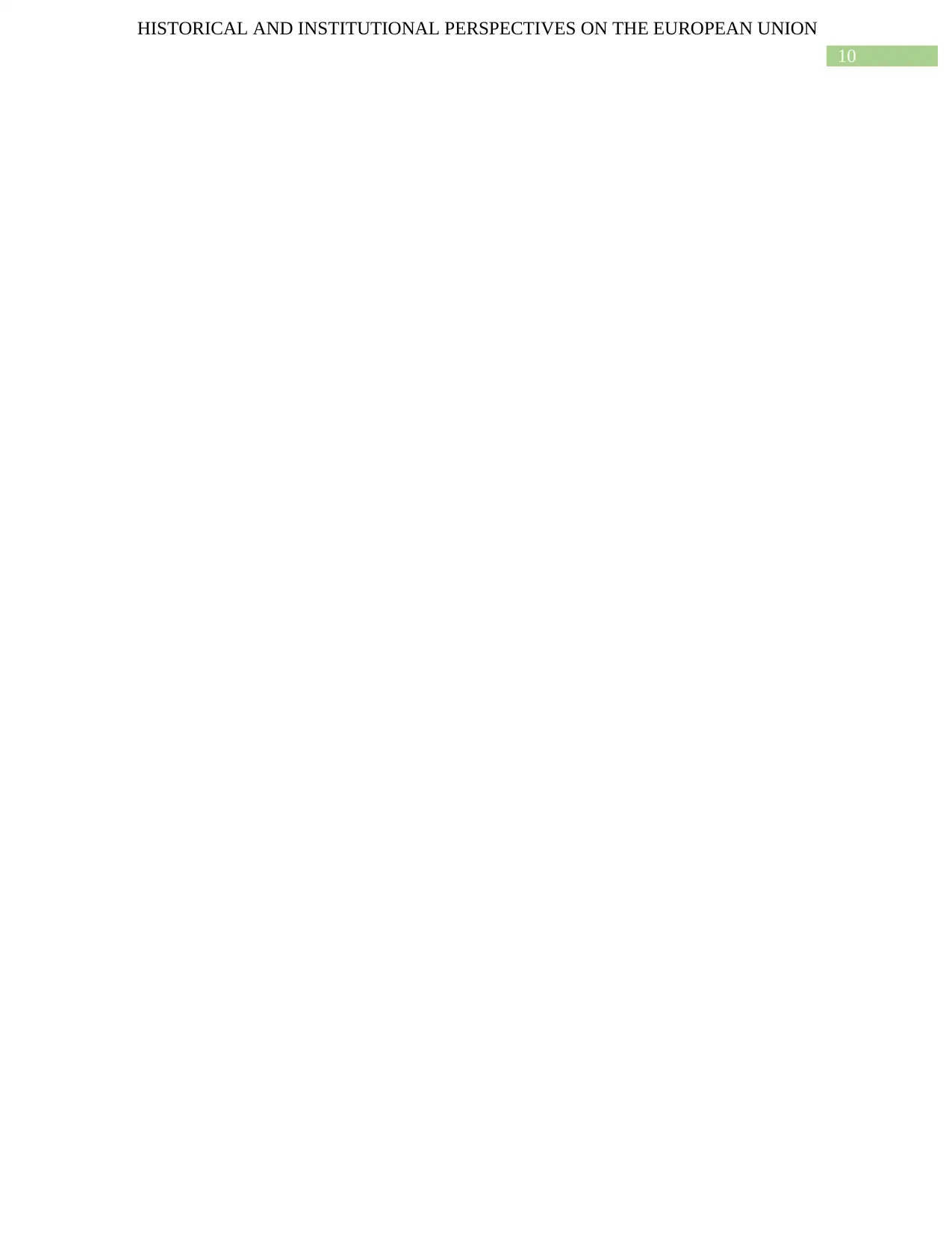
10
HISTORICAL AND INSTITUTIONAL PERSPECTIVES ON THE EUROPEAN UNION
HISTORICAL AND INSTITUTIONAL PERSPECTIVES ON THE EUROPEAN UNION
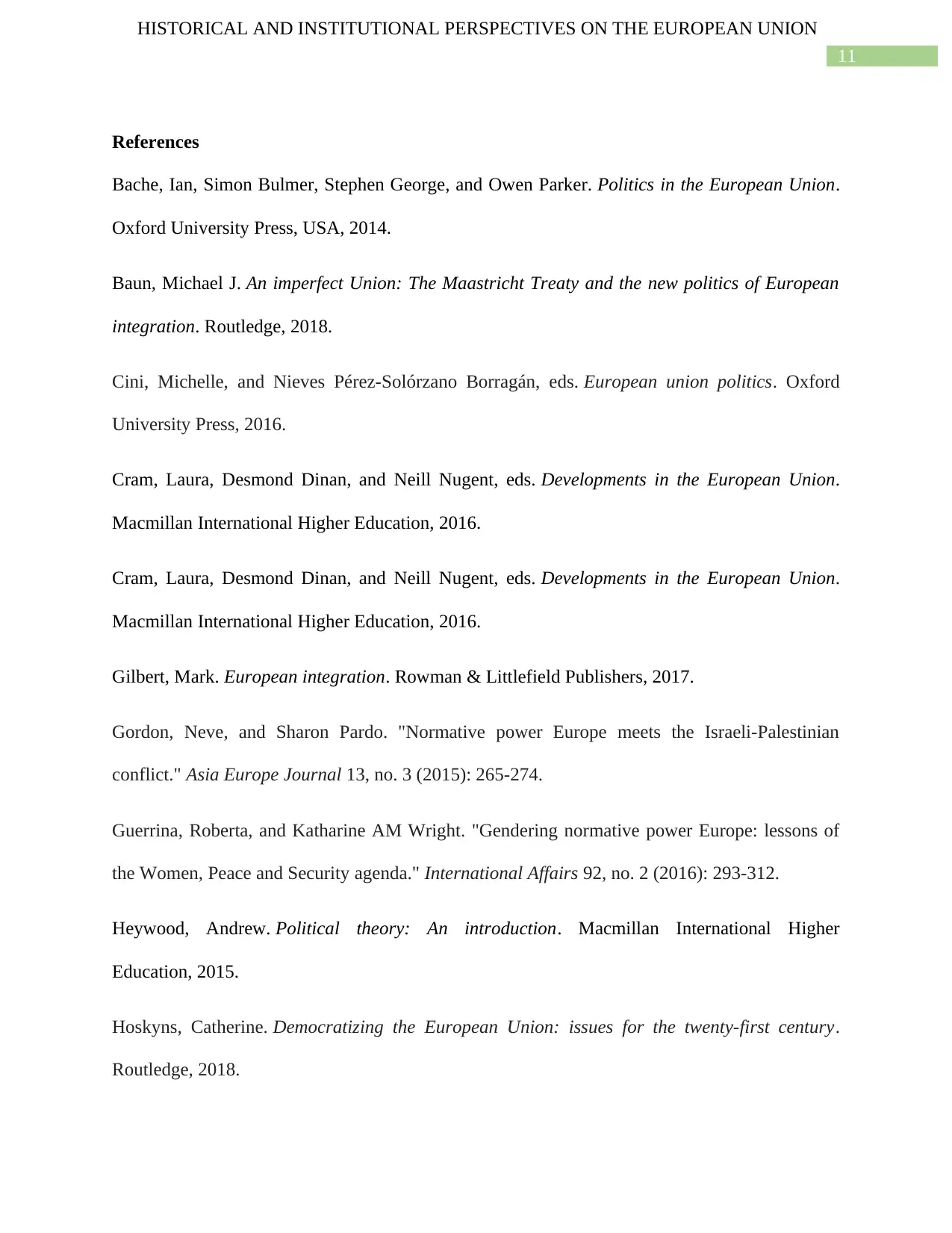
11
HISTORICAL AND INSTITUTIONAL PERSPECTIVES ON THE EUROPEAN UNION
References
Bache, Ian, Simon Bulmer, Stephen George, and Owen Parker. Politics in the European Union.
Oxford University Press, USA, 2014.
Baun, Michael J. An imperfect Union: The Maastricht Treaty and the new politics of European
integration. Routledge, 2018.
Cini, Michelle, and Nieves Pérez-Solórzano Borragán, eds. European union politics. Oxford
University Press, 2016.
Cram, Laura, Desmond Dinan, and Neill Nugent, eds. Developments in the European Union.
Macmillan International Higher Education, 2016.
Cram, Laura, Desmond Dinan, and Neill Nugent, eds. Developments in the European Union.
Macmillan International Higher Education, 2016.
Gilbert, Mark. European integration. Rowman & Littlefield Publishers, 2017.
Gordon, Neve, and Sharon Pardo. "Normative power Europe meets the Israeli-Palestinian
conflict." Asia Europe Journal 13, no. 3 (2015): 265-274.
Guerrina, Roberta, and Katharine AM Wright. "Gendering normative power Europe: lessons of
the Women, Peace and Security agenda." International Affairs 92, no. 2 (2016): 293-312.
Heywood, Andrew. Political theory: An introduction. Macmillan International Higher
Education, 2015.
Hoskyns, Catherine. Democratizing the European Union: issues for the twenty-first century.
Routledge, 2018.
HISTORICAL AND INSTITUTIONAL PERSPECTIVES ON THE EUROPEAN UNION
References
Bache, Ian, Simon Bulmer, Stephen George, and Owen Parker. Politics in the European Union.
Oxford University Press, USA, 2014.
Baun, Michael J. An imperfect Union: The Maastricht Treaty and the new politics of European
integration. Routledge, 2018.
Cini, Michelle, and Nieves Pérez-Solórzano Borragán, eds. European union politics. Oxford
University Press, 2016.
Cram, Laura, Desmond Dinan, and Neill Nugent, eds. Developments in the European Union.
Macmillan International Higher Education, 2016.
Cram, Laura, Desmond Dinan, and Neill Nugent, eds. Developments in the European Union.
Macmillan International Higher Education, 2016.
Gilbert, Mark. European integration. Rowman & Littlefield Publishers, 2017.
Gordon, Neve, and Sharon Pardo. "Normative power Europe meets the Israeli-Palestinian
conflict." Asia Europe Journal 13, no. 3 (2015): 265-274.
Guerrina, Roberta, and Katharine AM Wright. "Gendering normative power Europe: lessons of
the Women, Peace and Security agenda." International Affairs 92, no. 2 (2016): 293-312.
Heywood, Andrew. Political theory: An introduction. Macmillan International Higher
Education, 2015.
Hoskyns, Catherine. Democratizing the European Union: issues for the twenty-first century.
Routledge, 2018.
⊘ This is a preview!⊘
Do you want full access?
Subscribe today to unlock all pages.

Trusted by 1+ million students worldwide
1 out of 13
Your All-in-One AI-Powered Toolkit for Academic Success.
+13062052269
info@desklib.com
Available 24*7 on WhatsApp / Email
![[object Object]](/_next/static/media/star-bottom.7253800d.svg)
Unlock your academic potential
Copyright © 2020–2025 A2Z Services. All Rights Reserved. Developed and managed by ZUCOL.